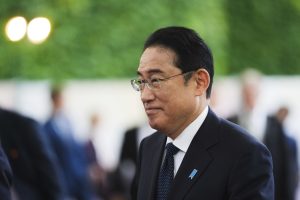Update: Japanese Prime Minister Kishida Fumio canceled his planned travel to Kazakhstan, Uzbekistan and Mongolia at the last minute following a warning from the Japan Meteorological Agency of an elevated risk of a “megaquake.”
The first summit between the countries of Central Asia and Japan will be held in Astana, Kazakhstan, this month. The “Central Asia plus Japan” Dialogue began in 2004 as an initial framework for dialogue with the representatives of the five Central Asian countries, and made Japan something of a pioneer in Central Asian diplomacy. Subsequently, South Korea, the EU, the United States, China, India, and Russia all adopted similar “5+1” frameworks.
However, given the nature of Central Asian countries, namely the dominant role that presidents play in foreign policy, the functions of the “Central Asia plus Japan” Dialogue, which involved foreign ministers, government officials, businesspeople, and intellectuals, proved to be limited, with the result that Japan’s presence in the region was overtaken by other countries. The significance of this inaugural summit meeting is therefore considerable.
Over the past 20 years, international relations in Central Asia have undergone considerable change. Relations among the Central Asian countries, which were rocky when Japan initiated the dialogue, improved dramatically in 2016 when Uzbekistan’s President Islam Karimov died in office, to be succeeded by Shavkat Mirziyoyev. In the meantime, the international community’s focus on the turmoil in neighboring Afghanistan has eased considerably compared with the years when the United States was waging its “War on Terror,” and although the return of the Taliban regime in 2021 is a cause for concern, it does not pose an immediate threat to Central Asian countries.
Meanwhile, economic relations between China and the Central Asia have expanded considerably. Russia – historically a key player in the region – has become a conundrum for the countries of Central Asia, which cannot support the war in Ukraine. Nonetheless, practical relations with Moscow have continued and trade has actually expanded.
What is the significance for Japan of deepening relations with Central Asia? Although it is a resource-rich region, it is hard to argue that it is economically crucial to Tokyo, especially given the high transportation costs imposed by its landlocked status. Nonetheless, like Africa and the Middle East, Central Asia is enjoying remarkable population growth, and it is relatively stable, making it increasingly attractive as a market. Above all, both Japan and Central Asia are adjacent to China and Russia, two major powers with the ability to shake the future world order. In that sense, to meet the challenge that China and Russia pose to the Western-centered world order, ensuring that Central Asia does not fall entirely under their sphere of influence will be vital.
Of course, severing relations with China or Russia is not an option for Central Asian countries. This is not simply because they are less powerful neighbors. For one thing, China is an important source of funds for infrastructure development. Moreover, some of the countries of Central Asia are becoming reliant on Russian natural gas, and increasingly on Russian investment in the energy sector as well. Nonetheless, over-reliance on China and Russia is not something Central Asian countries want either, and they have pursued a multi-vector diplomacy, seeking to build good relations with as many countries as possible, be they strong or weak. That opens the door for Japan to increase its importance as a partner to the region. Moreover, none of the countries of Central Asia want to be left behind by global trends, and so they will welcome the opportunity to deepen cooperation with Japan on global issues such as decarbonization.
Of course, within the region itself, circumstances differ from country to country, and so skillful diplomacy is essential. As a regional power, for instance, Kazakhstan is economically the most important partner for Japan, and at the same time it faces a potential threat from Russia and is in dire need of support in its bid for greater independence, or decolonization. Uzbekistan, Kyrgyzstan, and Tajikistan face the task of transforming their economic structures, which currently depend on labor migration to Russia. Although Japan cannot accept labor migrants on any scale comparable to that of Russia, creating an environment that welcomes talented individuals from these countries will be meaningful for Japan itself, which is grappling with a declining birthrate and an aging population. Although there are limited areas in which Japan can cooperate with the peculiar dictatorship of Turkmenistan, the Eurasian east-west transportation route through that country and the Caspian Sea is growing in importance.
In deepening Japan’s relationships with the countries of Central Asia, it will be important for Tokyo not to impose its ideas, but rather to skillfully accept the thinking of its interlocutors. The concept of “respect for sovereignty and independence” is more easily shared than “free and open,” for instance. For its part, Kazakhstan advocates a role for middle powers in reviving multilateralism, an aspect of the world order that has been undermined by the great powers. This is an idea that Japan should strongly support.
According to media reports, decarbonization, strengthening logistics networks, and human resource development are expected to be the main areas of cooperation at the summit. All are appropriate agenda items, but what is important is that they be continuously addressed on a sufficiently large scale. China and Russia tend to have the upper hand in relations with Central Asia because of their permanent involvement in the region, while the West and Japan usually engage only sporadically and intermittently. The summit needs to be more than just a one-time event; rather, it should herald a permanent strengthening of Japan’s diplomacy in the region.

































